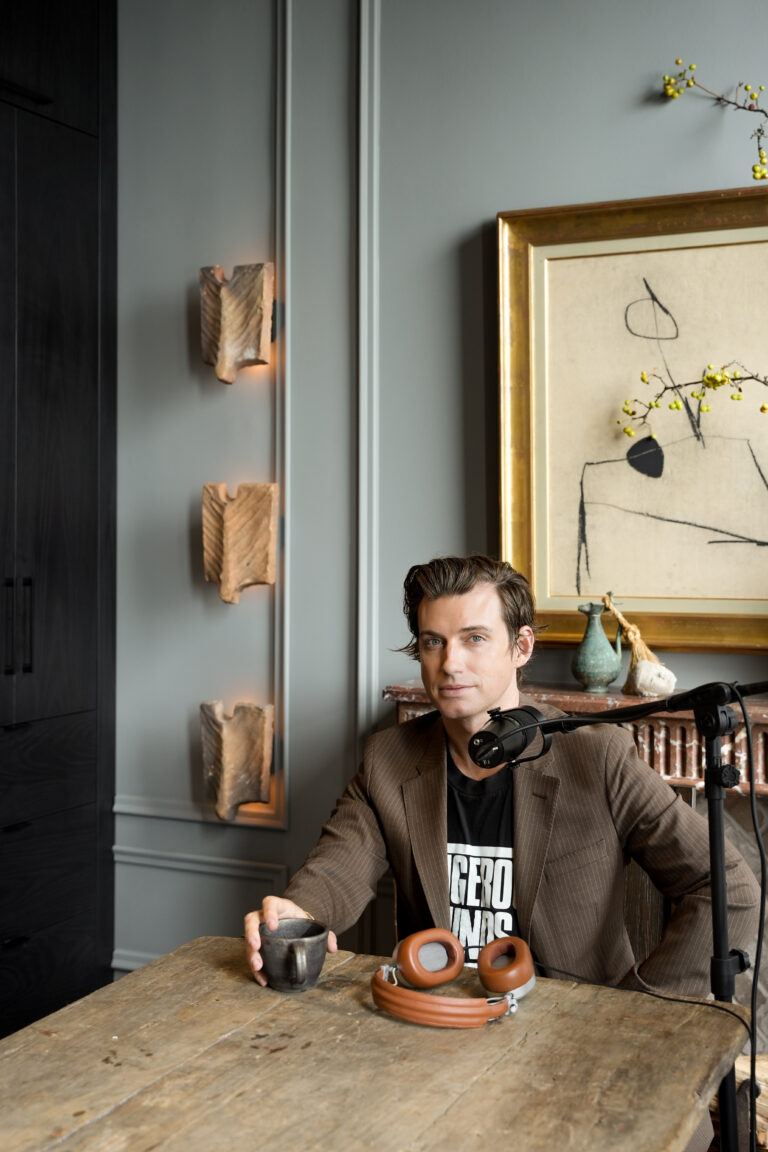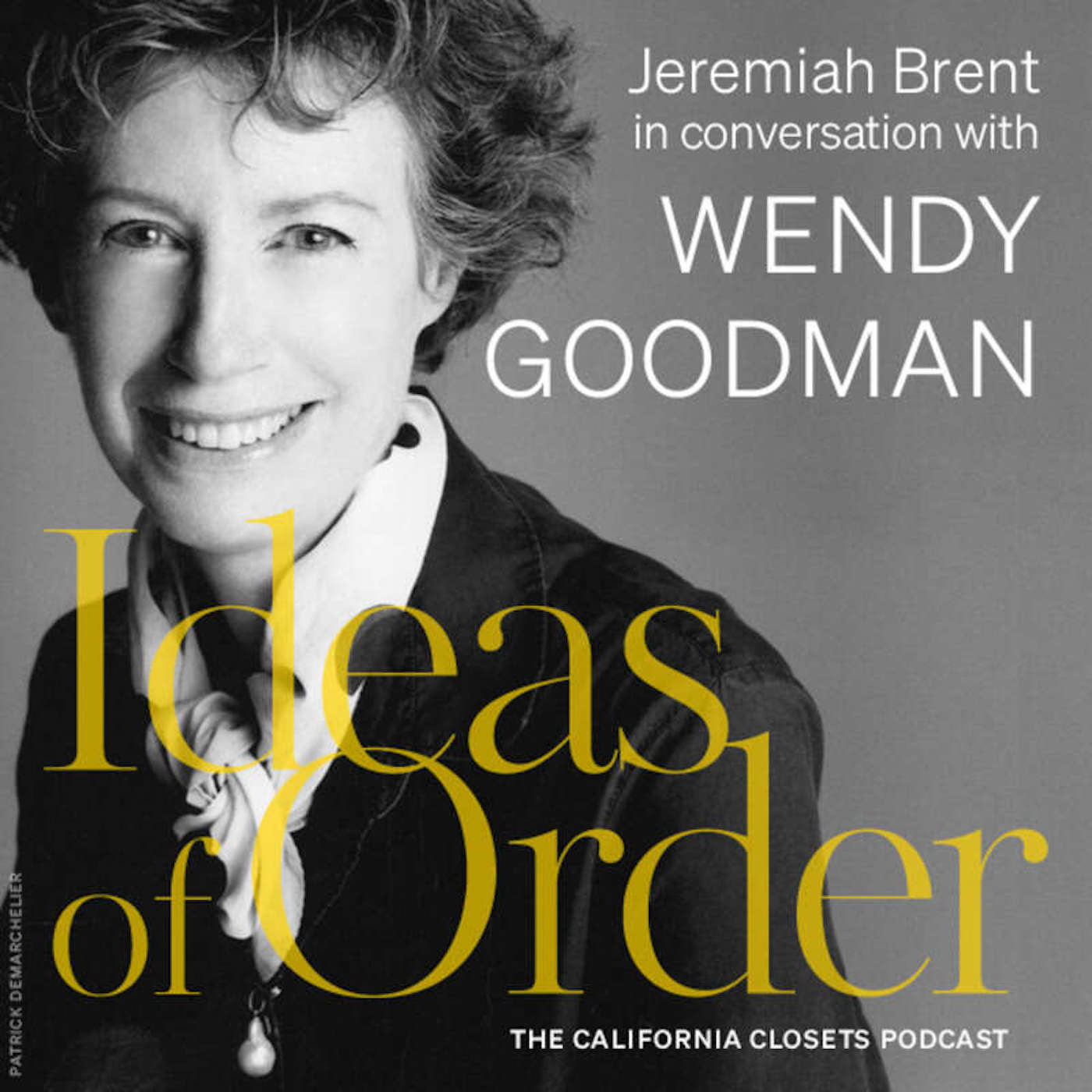This transcript was generated by an automated service. In some cases it may be incomplete or inaccurate due to inaudible passages or transcription errors.
Dan: [00:00:00] I was not allowed to do all the things I wanted to in my room, and I was like not allowed to have a tv. I wasn’t, you know, the computer couldn’t be in the room like I. Uh, it was a place to sleep and do your homework and, and that was it.
Welcome
Jeremiah: to Ideas of Order, a podcast dedicated to answering the question, what does home mean to you? I’m Jeremiah Brent. Today’s guest has been an instrumental voice in design journalism for over 20 years from his start at House and Garden to his time at Departures and Surface Magazines. He is now a regular contributor to major publications like the New York Times.
Architectural Digest, the Wall Street Journal. He is a renowned author, curator, lecturer, and more recently the host of the podcast, the Grand Tourist. I’m really pleased to welcome the encyclopedic and ever-Curious, Dan Rubenstein.
Dan: You
Jeremiah: grew up in New York though, right? You’re a true new Yorker on Long
Dan: Island. I’m a long Islander technically, but I consider myself a new Yorker, even though, but to me. New York was always the shining city on the hill. You know, that was always like one commuter train right away from the big city. Yeah.
And death to me would be like not getting
Jeremiah: there. Did you come into the city a lot when you were younger or you just
Dan: Yeah, no, all the time. You know, when you’re, when you grow up in the area, like all of your school trips are too. Museums or Ellis Island or whatever. And you know, my, my grandparents lived in Queens and cousins that lived in Manhattan and so we, you know, we would go to the city all the time.
Yeah. But to live there and to know that you’re not gonna sort of. Stay on Long Island was like a big part of my psyche. And actually, Athena Calderon is also from Long Island. Yeah. I Are you
Jeremiah: guys from the same area?
Dan: Uh, not the same town. Yeah. But like, you know, probably within a 10 minute drive, once we knew we were both from Long Island, we were like, oh yeah.
Yeah. There’s [00:02:00] like a, there’s like a glint in the eye of like a recognition because there’s not that many people in our world that are kind of from where we’re from, I think. Right. It’s a complicated. Place. It’s not quite the, it’s not the city at all. Yeah. It’s a completely different culture and it’s not the Hamptons and it’s not out east and it’s a lot of different worlds all rolled into one.
And I was really blessed to be in this town that’s was, you know, on one side of the town was sort of like very wealthy and very well to do. And the other one was much more working class and I had an extremely diverse. School and an extremely diverse group of friends. And you know, although I’m sure looking back, I would look at it and be like, wow, it’s not as diverse as I remember it being, but I know that for the time it really was.
Especially when I see other people, you know, old photos of other people in other, other towns. And also my, my own family is a, it’s kind of a unique background also.
Jeremiah: Why is it unique? Are you, and are your parents still there?
Dan: Uh, my mom has passed. My dad is still in the same house, you know, that I grew up in, and it’s a, it’s a house that I’m going to inherit.
One day my dad is like, you know, one day this is all gonna be yours. And, and I, but really what he means is this is all going to be your problem. Yes. Get ready, get ready. I know the house very well, but I’m, I’m ready spiritually. You know, my dad grew up on Long Island also. He was born in, in Brooklyn. Um, his family is very much a New York family.
They have their own colorful history. Like my great-grandfather was an amateur boxer, turned like low-level mob enforcer. I. Turned union guy love this story. He self-published a, an autobiography about his life. No, that was written by a cousin who was a magazine editor. It was very, uh, that’s a whole other story.
And then my, and my grandparents, uh, on my mother’s side and my mom, my mom was born in Switzerland During the war, they were from Croatia and Mm-Hmm. It was a household where people spoke four languages or five languages sometimes. So there were, I love that. There were different levels of security depending on what they wanted people [00:04:00] to over here
Jeremiah: We have fun Thanksgiving day meal.
Dan: Yeah. My grandmother, my, my mom used to say, my only regret raising you was that I didn’t speak another language to you growing up. So my mom kind of grew up in Uruguay in her sort of formative years, then moved to Queens when she was 16 and um, my grandmother worked in us in a. Fabric-cutting factory. And the, she, she, uh, connected, her boss had a son and she had a daughter, and they, they set them up on a date.
It didn’t work out. Then they got back together again, and it did, and then And that’s was your dad?
Jeremiah: Yeah. Oh my God. What does hell look like then? Uh, with a melting pot of a family like that? Like can you describe your house growing up and what it looked like and felt like?
Dan: I would say it was very sort of like slightly more formal than all of my friend’s houses.
Really. Like slightly more? Yeah, slightly more formal, slightly more, you know, my mom was like super fastidious. Yeah. Uh, in a way that my, my dad is not, I. There were like little, like a small porcelain figurine on a lacquered wooden side table and curtains with ruffles and you know, it was a little bit more proper and designed in a way.
Right. And sometimes I think like maybe my mom would’ve been a really good interior designer. She really had like trained at it, you know? Mm-Hmm. And it was a very classic house of two-car garage basement. My mom would never get rid of anything that could be reused against. Everything was like cleaned and stored properly in the basement and all that kind of stuff.
Yeah. It sounds like
Jeremiah: she was super intentional with the way she lived.
Dan: Yeah, absolutely. No, there was silverware for the right kind of occasion, and there was proper linens for Passover dinner and there were this and there was that. So it was all kind of done correctly. What was your room like growing up?
I was not allowed to do all the things I wanted to in my room. No, no. So like I was not one of those kids were like, oh, and I put everything all over my walls and was like my own. I had posters, which I eventually got rid of. Do you remember what the posters were of early, early [00:06:00] nineties? Like geeky stuff?
There was a really famous Iron Man poster that I had. There was like a Roger Rabbit poster. ’cause I was obsessed with Roger Rabbit as a kid. It’s an amazing film. I’m an only child, so I didn’t grow up with any other kinds of, like, no one taught me about music. I had to discover music on my own right after college, basically.
So wild. Yeah. So, you know, I didn’t have that kind of a, and I was like not allowed to have a tv. I wasn’t, you know, the computer couldn’t be in the room. It was a place to sleep and do your homework and. And that was
Jeremiah: it. Why do you think that you had no autonomy in there? Was it just like, it felt like chaos to the house or they just like, what was the, what do you think the reasoning
Dan: was?
Yeah, I’m sure if you went back in time there would be like toys and things everywhere, of course, as I was a kid. But, um, yeah, my mom just wanted it to be kind of, I. Clean and proper and like I watched enough TV as a kid, they didn’t want me to like also stay up in the middle of the night and watch tv. So yeah, they would never let me paint like paint walls or anything like that.
Really. No. No, no. There was no, and I didn’t, and honestly, my entire career studying design and, and covering design. Was really by accident, so Right. This didn’t really enter my brain until 2002. Basically what happened in
Jeremiah: 2002,
Dan: I had already been working for a few years, um, right. Digitally, like in the early.com 1.0 days.
And then in 2002 I got the job working for a Mr. Mayor, Ross of House and Garden Big Deal as his assistant. And he was the design editor at House and Garden at the time, the original American. Magazine, beloved, beloved, which is now, there’s mostly a, a, a British Edition left, which is beautiful. Yeah. But yeah, the American in house and garden, which I’m sure many people might remember, was, you know, a magazine had been around for a hundred years and I wanted a job in, in magazines, and I didn’t know exactly what I wanted to cover.
Was it lifestyle or it was fashion or entertainment or whatever? Mm-Hmm. And I remember. Shax Regler, who’s now [00:08:00] a features director, I believe, somewhere, uh, at AD was like, are you interested in design at all? Because Mayor Russ needs an assistant. And I said, sure, of course. Oh, absolutely. And I had done some home coverage, you know, and other jobs that I, I had.
So it wasn’t completely unknown to me, but I had no idea. Like I had no, I just said yes and, and did it.
Jeremiah: What was it like? I mean, it’s your first real big job, right? You had had other jobs before, but this was like your first step into magazines and everything
Dan: working in house and garden. For me, back then to this day, I get a sense of like magic.
Yeah. When I think of like what it was like to work there. Not just magic, but also kind of strange sense of foreboding because everything there was so high pressure and the people that were around you were so incredible. Mm-hmm. That you know, you were on your best behavior at all times. I remember we did a page about purple things and we called in.
All the objects, like every vase, every, we shot them all. We then, I remember on a layout page, they had little Pantone chips next to each picture that they could send to the printer to make sure that every shade of purple was actually completely exact. And there would’ve been a hundred meetings about this one page story, where today, none of that would happen.
And it would just, you know, you might see one editor, maybe two you, you can’t really compare. I mean, I remember where one day we, we did a whole issue about beds. We didn’t just show pictures of 18 beds. Like we literally called in 18 beds to a warehouse, styled them all in Calvin Klein sheets because they were a big advertiser at the time.
Of course, photographed them all, silhouetted them all. And then had me write bed copy, which like shocks had to edit, but it made sense. But
Jeremiah: that was also like when people were really getting exposed to everything. You know, it’s like the same. It’s so interesting to me too. ’cause the home has had such a different trajectory [00:10:00] that I think obviously fashion has, but now like, I mean I look, I always think about, um, the magazines and I’ve talked to Wendy Goodman and I’ve talked to Amy Astley about everything in that.
Chapter and the time, the amount of effort that was put into everything and the thoughtfulness around, um, the journalism. You know, I was thinking about before we started talking, you know, you’ve had 20 plus years of design journalism, um, and I feel like you have had a real inside. View on the evolution of style and color and layout and decades of old trends.
Um, is there anything about home as you kind of look at it and as you pull out, um, that’s kind of remained consistent over the years from your perspective in the way you’ve kind of watched it all
Dan: evolve? You know, it’s funny you should mention that I went to my old issues of House and Garden and sort of looked through them and I’ve also been looking through my issues of Surface Magazine where I was the editor in chief for about.
Three years, and that was kind of in the recession periods. You know, the world of 2003 to 2006 is kind of when I worked at House and Garden, it was a very eclectic time designed from modernism was kind of coming back into vogue. Someone would have like a, a no, like a saranen table underneath, like a cowskin rug.
Mm-Hmm. You know, and that was like cool. And it was like the first time that people started to do the, the, so-called like high. Was like a brand new phenomenon. Yeah. A lot of red brooms back then, but it’s also remarkable how. Much things have not changed at all. I
Jeremiah: was just gonna ask you if the word trend is like a trigger for you, if you could never hear the word
Dan: trend again, I’m not one of those people that kind of like hates the word trend.
Okay. I think like, yeah, of course there are many trends, then they come and go. But you know, like we’re, we’re living in a complete era of personalization. At the end of 2002, when I started a house and garden, things really were to the trade and you really just couldn’t get them. You couldn’t just buy from a small store in Italy.
Discover them [00:12:00] on Instagram and have them ship you something and you didn’t have nearly the customization that you did, you really relied on to your designers to do that. For you. Modularity was like not a thing, and like nobody did it in product design. Um, so you really didn’t have the same amount of choice, but also, you know, it must be said.
As time went on, the world that came after the recession was the rich were richer than ever before. And so you can see that reflected in what homes are being covered and what they look like and who has the money and who doesn’t. You can see that shift completely, and you can also see the shift in how things get covered.
Honestly, you can pick up a copy of World of Interiors from 10 years ago and open up most of those homes and be like, wow, I would live in that today. Like if there, that, that difference is not so stark. But you know, at the end of the day, social media and stuff like that also has a. There’s like a reverberation effect, right?
Like you can do whatever you want. But then again, you know, there’s a reason why so many brands now are like, all their ads are of beige furniture and gray
Jeremiah: furniture. I know, but I think it’s, it’s interesting. There’s this, I think there’s a massive pendulum, um, obviously with anything but with design as well, and it.
Definitely swung one way where everybody wanted their space to look the same way. But now it’s definitely coming back to this moment in design where people are understanding that you can live a really beautiful life and it should be really personal. And it’s funny, I think about, you know. You cover so much ground in your reporting.
Uh, you’ve got art and design and interiors and fashion and architecture, food, travel. Is there one topic, you know, over the years that you find yourself gravitating towards more than others?
Dan: You know, of course I, design is the core of what I do, and I like to think of the Grand Tourist as like looking at the world through a design lens, right, if you will.
I think what’s most surprised me about it all is that the more people I talk to. The more similar I realize people are that are successful. Yeah. [00:14:00] So if I were to have a dinner party and I were to sit, take Annabel, Seldorf famous, you know, architect and sit her next to Eric repair French American seafood, Michelin, starred chef, you know, and and TV personality.
And then I brought in Anthony Gormley, like a sculptor from the uk. Yeah. They would all completely get along and have like a great time. They’re really successful people who are of a certain age. Mm-Hmm. And have stories to tell. They all have something in common. I love that,
Jeremiah: that sense of curiosity.
You’re so right. That’s the most important thing I think.
Dan: I think it’s curiosity and it’s resilience. Mm-Hmm. And I would say that almost everybody has gone against trend in some way, shape, or form. Yeah. They do different things and they fail and they get back up. I think that people talk a lot about resilience as being so important.
Almost it’s, it’s kind of like street smarts, but it’s like a, it’s a different kind of thing. Probably connected to it somehow, but yeah, resilience and the ability just to constantly fuel your own curiosity and just find a way of making money at it. Yeah. For a designer or creative person is like the key because Yes, trends do exist, especially in design.
They’re everywhere. Mm-Hmm. If you just follow trends, like then you’re like everybody else, then you’re not unique. Right? And therefore, why hire you? Right. So that’s what’s really surprised
Jeremiah: me. Is there anything that you won’t cover? I
Dan: try not to cover automotive. I try not, ’cause I don’t drive, first of all.
And you know, there’s a, there was a TV show called The Grand Tour and all that stuff. Yeah. Like I kind of try not to get into that. I have not had an actor on, for example, on the podcast and who knows, maybe one day I will if I feel it’s appropriate, but like musicians. Kind of, but like a composer. Yeah, I’d probably have a composer.[00:16:00]
Jeremiah: Has there been an interview that really like stuck out to you and made a real, like had a like profound impact on you? Oh
Dan: gosh. I would say my interview with Dieter Blair, I. Who if people that don’t know, um, is a very famous, you know, fundraiser socialite, you know, her husband was a, a diplomat during the heyday.
Fascinating. She would’ve dinner parties with Henry Kissinger and she has a beautiful new cookbook that raises funds for this foundation that studies diseases of the brain, you know, going to her home on the Upper East Side. All of the lessons I learned from my childhood of, you know, elbows in and all that stuff came rushing back.
I’d never been so petrified to have lunch with somebody. ’cause it was just the two of us in this enormous room and. In the, a east side genius. So, uh, I could talk to deal Blair for hours on end and ask a million questions. There are a ton of memories of different interviews that that stick out to me. I do most of my interviews remotely less that we’re speaking today.
Yeah. And sometimes I do them in person and sometimes being in personism it helps and sometimes it doesn’t really. Do you have one that you prefer? This is, this is a podcast geekiness. Yeah. I prefer to do them remotely. Yeah. Because it’s more secure from a. A backup point of view. If you’re doing them in person, someone can move in their chair and move away from a microphone really easily, and there can be noises and Right.
I send, you know, instead of a headset or a microphone where you’re really on a computer, it’s, it’s a different, it’s a different vibe, but every once in a while, you know, if I go to the headquarters of Van Cleef and interview the CEO, that’s a really. Amazing experience to see him there and to have him show me things in person.
Yeah. It’s not a bad spot to go. It’s not. It’s not a bad place
Jeremiah: to be. Can I ask you something? As we talk through, how do you translate? Physical experiences like walking into a room, tasting [00:18:00] food, smells of a new city. Um, how do you translate that to pen and paper? Like do you have a process from how you go from like three-D to two-D?
Just from a creative standpoint? I, I’m, I I in another life, I, I would’ve loved to have been a writer, but like, do you have a process for writing and storytelling? There are two
Dan: lessons that I would say for anybody that’s trying to adapt a three-dimensional world into. And almost like one-dimensional word.
Exactly. Words. Yeah. Um, is one, pick your battles. You can’t say everything. You can’t ever let somebody know what it’s gonna be like. You know, you. And if you, the closer you get to that is the more amazing you can be. Right. And sometimes I think one of the issues where we run into with modern-day style journalism is that because so much of it is online and because the budgets are as such and because, uh.
A staff writer at a large website will have to publish 10 stories a day, right? They’re not there in person, and so they are working from an extremely limited amount of information to work with. Mm-Hmm. It’s the difference between someone saying, you know, if you were a chef, if you have two chefs and one chef could go to all of the markets in Paris at six A.M.
or five A.M. in the morning and pull the best, and then make the best meal for their C clients. And then the other person was only allowed to go to this one bodega and find and make a meal from what they could find there. Like that’s the difference, right? So if you want to translate what your work is or what you saw, like you have to, or what you like, you have to actually be there, touch it and experience it.
And I think the really great writers about travel or style or design. Yes, you need, uh, a kind of a knowledge about what you’re talking about, but nothing can replace this sort of first person experience of, you know, what it was like [00:20:00] when you entered the restaurant, right? What was it like? What did it smell like?
You know, what stood out to you? Was there a woman in the, in the restaurant with a little dog? You know, like that kind of stuff is what makes a really beautiful. Piece, a written piece. And so you, you that to me, you know, all of the pieces that I’ve ever written that I can remember where I really am proud of it.
Mm-Hmm. Are always, always, always the ones where I experienced something myself. Yeah. And not the ones where I just did a phone interview or. You know, God forbid had a press release and just to just pull from there.
Jeremiah: Right. I was gonna ask, because you know, obviously post-pandemic, there was all these professional shifts, um, and was wondering if it was difficult to switch to observing the world through a more remote digital lens.
I mean, are you traveling again?
Dan: Yeah, I, so I started, uh, the Grand Tourist during the pandemic Right. As a creative project. As like 10 episodes. That’s it. I’m gonna do one season and if I don’t like it, I’ll just delete it. Famous last words. Yeah, I know, right? And then I was almost done recording the entire season and uh, then the magazine that I had most recently worked for, Departures Magazine, folded unexpectedly, and we were all out of a job in kind of the middle of.
Lockdown, more or less I just sort of ran with it and found that people were, this was something that people were really hungering for. This kind of like a sort of luxurious in-depth hour-long conversation with a legend in or really fascinating person in these worlds of style that we would’ve covered in House and Garden 20 years ago.
And it’s also worth pointing out that like you can’t love design or architecture or art if you only love one of those things. I agree. So if you open up an old issue of House and Garden, there’s a column about classical music. Mm-Hmm. There’s a column about every once in a while we’d do something about poetry.
Like we would, we, you know, we did things, [00:22:00] we covered gardening, we covered home, we covered food. You know? Yes, of course the heart and soul of it all were rooms, pictures of rooms. But at the end of the day, it’s about life and design is really about your life in total, not just about decorating and buying a sofa.
So. That to me is kind of what informed the concept for the Grand Tourist. Mm-Hmm. Is that I kind of felt like nowadays there’s kind of like people poo-pooing this idea of what people went on a grand tour for. Right. You know, people went on a grand tour, they’d be a rich kid, usually a rich landowner, let’s say in, in England.
And they would then spend their year, a gap year leaving home probably for the first, leaving the country probably for the first time. And they would spend well over a year getting to Italy over land and and sea. And they would go there so they could see Rome, see the architecture, eat the food, experience Paris, you know, come back.
And then they could be a landlord selling coal or whatever they did. Right. But you weren’t considered like a rounded. Person probably worthy of marriage if you were someone who didn’t, hadn’t seen something of the world. Right. And learned something about the finer things. And it’s not purely frivolous to, to, to understand these things and to know these things, even if you’re not someone who owns a Patek Philippe.
Mm-Hmm. Like, you still should understand like why they’re so important, why they’re so beautiful. Yeah. Exposure. And so that’s a big part of what the grand tourist means to me. Yeah. Has
Jeremiah: it been, um, different for you to interview guests in this kind of new format?
Dan: A little bit. Yeah, a little bit. I would say it’s, it’s, it’s remarkably similar and one of the things that originally inspired the idea to do a podcast is I once.
You know, I’ve been using Apple products for a long time. Yeah. So all of my voice memos of every interview I’ve ever done kept getting carried over to every next iPhone that I had, to the [00:24:00] point where I once like looked deep in my Mac to find hundreds of like voice files of probably famous people, but I have no idea what they are with bad audio quality.
You can barely understand them. Oh, amazing. And I’m like, it’s all discombobulated. And I was like, well. You know, it would be great, even if this podcast doesn’t work out at the end of it, I will have beautiful sounding, highly organized and edited files, and I could say to somebody, look, I existed. I talked to all these amazing famous people.
It’s like my autograph book. But I have hour long conversations, not just stopping someone on the street for an autograph. You know, all of these people gave me an hour of their time and. And taught me something amazing about their life and about the world and about the craft or art that they are involved in, that they’ve dedicated their life to.
And so to me that kind of idea of like, I was here, I created something, it’s not art, but it’s sort of like a life of learning and curiosity. Um, and, and I am a tourist in that sense. Like I don’t, I didn’t study art and design in school. Like I’m still a novice, I still. You could put a gun to my head, and I couldn’t tell you the difference between like two different types of red grapes and wine.
Like, you know, I, I couldn’t do that. Um, but I love hearing and asking questions with the people, and I think that that helps because I. People who listen are like, oh, you know, Dan’s not just, just already know everything.
Jeremiah: You’re still collecting your comic books. I love it. You’ve got your whole collection traded.
Dan: Iron Man for Dieter Blair, but hey,
Jeremiah: he traded up. Um, yes, very much so. And you’re closing in on a hundred episodes,
Dan: right? Yeah. Next year we’ll be, uh, probably around the springtime we’ll hit episode 100.
Jeremiah: How do you show up for all your guests over and over again? Well, is there a process like before you interview that you like, put yourself through so that you’re present and excited all, uh, with every interview?
Is it just [00:26:00] inherently there?
Dan: There’s nothing motivating, like watching someone stare at you on video. I know to be like, you know, I do my homework. Yeah. And I, you know, if you’re a journalist, the best co, the best compliment you can ever get from a guest is someone who stops and goes, wow, you’ve really done your homework.
Yeah. Because they get asked probably a lot of like really dumb questions. I will ask basic questions, but. I will also kind of reference something that maybe they said to the New York Times in the 1990s and say, you know, you once said the, you know, your art was not about this, but about that. And I was wondering, can you really explain about, explain that and follow up on these kinds of things.
So the preparation is, is part of the process and, um, once I have my questions prepared, um, I typically tend not to get nervous.
Jeremiah: One thing that you had mentioned that I still can’t stop thinking about is your bedroom growing up and how you weren’t allowed to paint the walls or anything, which makes me think about home now for you.
Um, what is home now? Like, what is your space look like and feel
Dan: like? Well, uh, my home today is sort of dominated by the storage of books. My husband is a book editor. I have a massive collection of magazines and art books and museum catalogs and things like that. Um, and assorted knickknacks and. Gifts given to me as, as an editor over the years.
Not all of it fancy, but they all kind of mean something to me. So yeah, that, that, that is my home is dominated by that. And it is a kind of an organized chaos because, uh, it’s a small Manhattan apartment. Um, it’s a one-bedroom. Um, and I would say like my most prized possession from a design point of view, mm-hmm, would be my sofa, which I had custom-made, even though I’ve owned it for almost 10 years.
Every time I sit in it and I touch, it’s a maharam. A hundred percent cotton, blue velvet. I love that. And every time I sit and I touch it, it’s like, oh, that’s so nice. And that’s when I kind [00:28:00] of feel the most at home. Because A, it’s a beau, it’s a beautiful velvet, it’s a really comfortable sofa and it fits in my tiny space, but I also know what hell I went through to get it made, which is a whole other conversation.
Custom, um, custom sofas are a nightmare, just so you know. Yes. And you know, if you’re not an interior designer, it’s all new to you. So even
Jeremiah: if you are you guys, my husband just had one made and it arrived and it looked like Blue’s Clues. So yeah, it’s not always
Dan: a success, but you know what, A good sofa will last you.
A very
Jeremiah: long time. Looking back, everything you’ve kind of covered, everything you’ve witnessed, everything you’ve shared. What has home taught you?
Dan: Hmm. I often think about like what would, like if an alien came here, you would kind of see like the human race lives in these buildings. They surround themselves with things that they use every day, so it’s a natural reflection of their environment.
Just like. A molehill or a, you know, uh, an ant colony is a reflection of like the breed of ant, the species of ant, right? Like our homes reflect everything about us. And I think the best homes are always the ones that are like the most personal and then they’re one of a kind.
Jeremiah: What a fascinating interview. I just want to thank Dan for all of his time and his insight. It’s always interesting for me to learn something about not only some of these’s process, but their perspective, and he has really, um, been at the forefront of design and journalism for so long. It was a real pleasure.
I’d love to hear more about the special places in your life that maybe you’ve shared with a loved one. Please make sure to. Post, comment or tag us on Instagram at Ideas of Order. California Closets. Ideas of Order is a California Closets podcast. Thank you so much to the team behind the scenes. This episode is produced by Rob Schulte and Rachel Senator at the Surround Podcast Network by Sandow Design Group Grow.[00:30:00]













